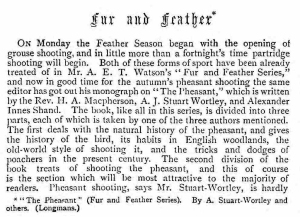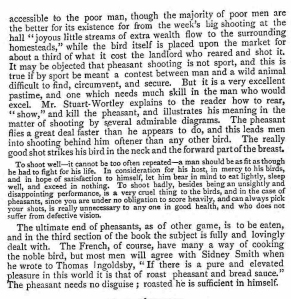
Reading this book review from 1895 will almost certainly anger practitioners of what is now called animal rights. It will cause bird protection societies to tut tut about how unfeelingly cruel were our ancestors. And of course the class warriors will take it upon themselves to behave as the encouraged guard dogs of our morality. But that is not why I wanted people to read this. It is subtler by far than any of the clichés that those stances evoke.
And by the way, the last mammal I killed was a pet hamster, irrevocably wounded by my then girlfriend who accidentally dropped a fan heater on its little body. If that hamster were a soldier it would have demanded I shoot it then and there. As it was, a makeshift execution kit of tea towel and a ladle hastily grabbed from the kitchen despatched our little Che (for that was what we named him) to the big wheel in the sky. I have never eaten pheasant.

I have my opinions about the Victorian upper classes’ attitude to that amalgam of emotions — death generally, killing humans, killing animals and what constitutes sport — but I do not want to cloud the way you see this article with my vision. Is it honest in a way we aren’t? Is this a marker that civilisation really does improve itself over time and we have since then? Is it disarmingly aware of trickledown economics?
Non-vegetarians might want to consider their viewpoint amid the shrink wraps in the meat aisle of their local supermarket.

A while back I wrote about Edward Bok, an American editor of women’s magazines who tried to lead women away from egret feathers in a magazine campaign highlighting the cruelty used to obtain the popular long feather. It seems the mother egrets had to be starved to get the longest feathers. As soon as the story ran the demand for egret feathers skyrocketed. Bok admitted that the admiration he had for women due to the influence of his strong mother was greatly diminished after working at a women’s magazine.
Neither was he keen on allowing women to vote